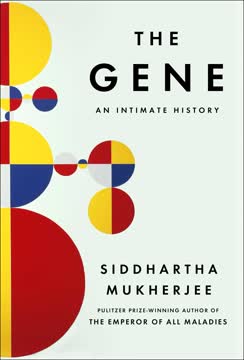Key Takeaways
1. The immune system: Your body's complex defense network
The immune system is not a mere tool to make your cough go away. It is inextricably tied into almost all other processes in your body—and while it is centrally important to keeping you alive, it is likely that it may also be the part of your body that causes your untimely death, either by failing or by being too active.
A vast network. The immune system is an intricate network of organs, cells, and proteins that work together to protect your body from harmful invaders. It's not just a single entity, but a complex system that spans your entire body.
- Key components:
- Lymph nodes
- Bone marrow
- Thymus
- Spleen
- White blood cells (e.g., T cells, B cells, macrophages)
- Antibodies
Balance is key. The immune system must maintain a delicate balance between being strong enough to fight off pathogens and regulated enough to avoid attacking the body itself. This balancing act is crucial for overall health and longevity.
2. Innate immunity: The frontline defense against invaders
The soldiers of the Innate Immune System have already killed billions of enemies and parasites in your life, and it is ready to kill billions or trillions more.
First line of defense. The innate immune system is your body's immediate response to threats. It's non-specific, meaning it doesn't distinguish between different types of pathogens, but acts quickly to contain and eliminate potential threats.
Key components of innate immunity:
- Physical barriers: Skin, mucous membranes
- Chemical barriers: Stomach acid, enzymes in saliva and tears
- Cellular responses: Macrophages, neutrophils, natural killer cells
- Inflammatory response: Redness, swelling, heat, and pain
Always on guard. This system is constantly active, patrolling the body for any signs of danger. It's what causes immediate reactions like inflammation when you get a cut or infection.
3. Adaptive immunity: Your body's targeted response system
The Adaptive Immune System "knows" every possible intruder. Its name, what it had for breakfast, its favorite color, its most intimate hopes and dreams.
Precision targeting. The adaptive immune system is like a highly specialized military force. It creates custom-made weapons (antibodies) to fight specific invaders and remembers them for future encounters.
Key features of adaptive immunity:
- Specificity: Targets specific pathogens
- Memory: Remembers past infections for faster future responses
- Adaptability: Can respond to new threats
Time and precision. While slower to respond than innate immunity, the adaptive system is incredibly precise and efficient once activated. It's responsible for long-term immunity and is the basis for how vaccines work.
4. The microbiome: Your body's ecosystem of beneficial microbes
Your body would like to get rid of some but can't and has to learn to coexist with them, others are neutral, and a huge group is directly beneficial to your health. These communities of commensal microorganisms are as essential to your survival and health as any of your organs.
Symbiotic relationship. The human body is home to trillions of microorganisms, collectively known as the microbiome. These microbes play crucial roles in digestion, immunity, and overall health.
Key points about the microbiome:
- Location: Primarily in the gut, but also on skin and other areas
- Diversity: Hundreds of species of bacteria, fungi, and viruses
- Functions: Aid in digestion, produce vitamins, train the immune system
Balance is crucial. A healthy microbiome is diverse and balanced. Disruptions to this balance (through antibiotics, poor diet, etc.) can lead to various health issues, including weakened immunity.
5. Autoimmune diseases: When the immune system attacks itself
Autoimmune diseases don't just happen though. For most people they are a colossal case of bad luck.
Mistaken identity. In autoimmune diseases, the immune system mistakenly identifies healthy cells as foreign invaders and attacks them. This can lead to a wide range of conditions affecting various parts of the body.
Common autoimmune diseases:
- Rheumatoid arthritis
- Type 1 diabetes
- Multiple sclerosis
- Lupus
- Psoriasis
Complex causes. The exact causes of autoimmune diseases are not fully understood, but they likely involve a combination of genetic predisposition and environmental factors. Managing these conditions often involves suppressing or modulating the immune response.
6. Allergies: Overreactions of the immune system
Being allergic means that the immune system massively overreacts to something that might not be all that dangerous.
Hypersensitivity reactions. Allergies occur when the immune system overreacts to harmless substances (allergens) in the environment. This overreaction can range from mild discomfort to life-threatening situations.
Common allergies and symptoms:
- Hay fever: Sneezing, runny nose, itchy eyes
- Food allergies: Hives, swelling, digestive issues
- Insect sting allergies: Swelling, difficulty breathing
- Anaphylaxis: Severe, potentially fatal allergic reaction
Evolving understanding. Our understanding of allergies is still evolving. Recent research suggests that early exposure to potential allergens might actually help prevent allergies, challenging previous beliefs about avoidance.
7. Boosting immunity: Debunking myths and promoting health
Boosting the Immune System is a horrible idea that is used by people trying to make you buy useless stuff!
Balanced, not boosted. The idea of "boosting" the immune system is largely a myth. A healthy immune system is about balance, not strength. Overactive immunity can be just as harmful as underactive immunity.
Factors that support immune health:
- Balanced diet rich in fruits and vegetables
- Regular exercise
- Adequate sleep
- Stress management
- Avoiding smoking and excessive alcohol consumption
Beware of quick fixes. Most products claiming to "boost" immunity lack scientific evidence. Instead of seeking miracle supplements, focus on overall health and lifestyle choices that support your immune system's natural function.
8. Stress and immunity: The mind-body connection
In the wild, stress is usually connected with existential danger, like a rival that crosses into your territory or a predator that wants to make you its meal.
Evolutionary remnant. Our stress response evolved as a survival mechanism, preparing the body for "fight or flight." However, in modern life, chronic stress can have detrimental effects on the immune system.
Effects of chronic stress on immunity:
- Increased inflammation
- Suppressed immune function
- Higher susceptibility to infections
- Slower wound healing
Mind-body connection. Managing stress through techniques like meditation, exercise, and social connection can have positive effects on immune function. This highlights the important connection between mental and physical health in overall immunity.
Last updated:
FAQ
What's Immune: A Journey into the Mysterious System that Keeps You Alive about?
- Exploration of the Immune System: The book delves into the complexities of the human immune system, explaining how it protects us from various pathogens and diseases.
- Engaging Narrative Style: Philipp Dettmer uses relatable analogies and storytelling to make complex scientific concepts accessible to readers without a background in immunology.
- Connection to Modern Issues: It addresses contemporary health issues, including the rise of autoimmune diseases and the impact of the COVID-19 pandemic on our understanding of immunity.
Why should I read Immune by Philipp Dettmer?
- Understanding Health Better: The book provides essential knowledge about how the immune system functions, which can help readers make informed decisions about their health and wellness.
- Relevance to Current Events: With ongoing discussions around health, vaccines, and pandemics, this book offers valuable insights into how our immune system functions.
- Holistic Perspective: It connects the immune system to various aspects of health, disease, and lifestyle choices, helping readers appreciate the importance of maintaining a healthy immune system.
What are the key takeaways of Immune?
- Immune System Complexity: The immune system is described as "the most complex biological system known to humanity," with intricate interactions among various cells and proteins.
- Balance is Essential: A well-functioning immune system requires balance; it must be strong enough to fight infections but not so aggressive that it attacks the body itself.
- Role of Memory Cells: Memory cells play a crucial role in long-term immunity, allowing the body to remember past infections and respond more effectively to future encounters.
What are the best quotes from Immune and what do they mean?
- "Your immune system is not a singular thing.": This quote underscores the complexity of the immune system, highlighting its various components and their interconnections.
- "You are a biosphere, surrounded by invaders that want to get in.": This emphasizes the constant battle between our bodies and the myriad of microorganisms that inhabit our environment.
- "What doesn’t kill you doesn’t make you stronger.": This challenges the notion that exposure to pathogens always strengthens the immune system, highlighting the risks of excessive exposure.
How does the immune system work according to Immune?
- Defense Mechanisms: The immune system employs various defense mechanisms, including physical barriers, innate immunity, and adaptive immunity.
- Cellular Interactions: Key players include T cells, B cells, and macrophages, which communicate and coordinate their actions through signaling molecules called cytokines.
- Memory Formation: After an infection, the immune system creates memory cells that allow for a faster and more efficient response to future infections.
What is the Innate Immune System according to Immune?
- First Line of Defense: The Innate Immune System is the body's immediate response to pathogens, acting within seconds of an invasion.
- Generalized Response: It employs broad mechanisms to combat a wide range of pathogens, rather than targeting specific invaders.
- Key Components: Major players include Macrophages and Neutrophils, which actively engage and eliminate pathogens through various methods, including phagocytosis.
How does the Adaptive Immune System work according to Immune?
- Specificity and Memory: The Adaptive Immune System develops specific responses to pathogens and retains memory of past infections for faster responses in the future.
- Role of T Cells and B Cells: T Cells coordinate the immune response, while B Cells produce antibodies that target specific antigens.
- Activation Process: Activation requires two signals: recognition of an antigen by a T Cell and additional stimulation from a Dendritic Cell.
What is the Hygiene Hypothesis mentioned in Immune?
- Connection to Allergies: The Hygiene Hypothesis suggests that reduced exposure to microbes in modern, sanitized environments may lead to an increase in allergies and autoimmune diseases.
- Impact of Urbanization: As societies have become more urbanized and hygienic, the diversity of microbial exposure has decreased, potentially leading to an imbalance in immune responses.
- Need for Microbial Diversity: The hypothesis emphasizes the importance of maintaining a diverse microbiome for optimal immune function.
How do vaccines work according to Immune?
- Inducing Immune Response: Vaccines work by introducing a harmless component of a pathogen to stimulate the immune system.
- Memory Cell Formation: Vaccination leads to the production of memory cells, which provide long-term immunity.
- Types of Vaccines: There are various types of vaccines, including live-attenuated, inactivated, and subunit vaccines, each designed to provoke an immune response without causing disease.
What are Antibodies and their functions according to Immune?
- Specialized Proteins: Antibodies are proteins produced by B Cells that specifically bind to antigens, marking them for destruction.
- Multiple Functions: They can opsonize pathogens, neutralize toxins, and activate the complement system to enhance the immune response.
- Diverse Classes: There are different classes of antibodies (IgM, IgG, IgA, IgE), each serving unique roles in immune defense.
How does inflammation contribute to the immune response according to Immune?
- Universal Response: Inflammation is triggered by injury or infection, serving to contain pathogens and facilitate healing.
- Five Key Signs: The classic signs of inflammation include redness, heat, swelling, pain, and loss of function.
- Double-Edged Sword: While inflammation is essential for fighting infections, chronic inflammation can lead to various diseases and health issues.
How does Immune explain autoimmune diseases?
- Misguided Immune Response: Autoimmune diseases occur when the immune system mistakenly attacks the body's own cells.
- Role of Self-Antigens: The immune system can recognize self-antigens, leading to an inappropriate immune response.
- Complex Interactions: The development of autoimmune diseases involves complex interactions between genetic factors, environmental influences, and immune system responses.
Review Summary
Immune by Philipp Dettmer is highly praised for its accessible explanation of the complex human immune system. Readers appreciate Dettmer's engaging writing style, use of metaphors, and colorful illustrations. The book is lauded for its ability to simplify difficult concepts without oversimplifying, making it appealing to both laypeople and those with scientific backgrounds. Many reviewers note the book's humor and compelling storytelling approach. While some find the anthropomorphizing of cells jarring, most agree it aids understanding. Overall, the book is widely recommended for its clear, comprehensive overview of immunology.
Similar Books










Download PDF
Download EPUB
.epub digital book format is ideal for reading ebooks on phones, tablets, and e-readers.




